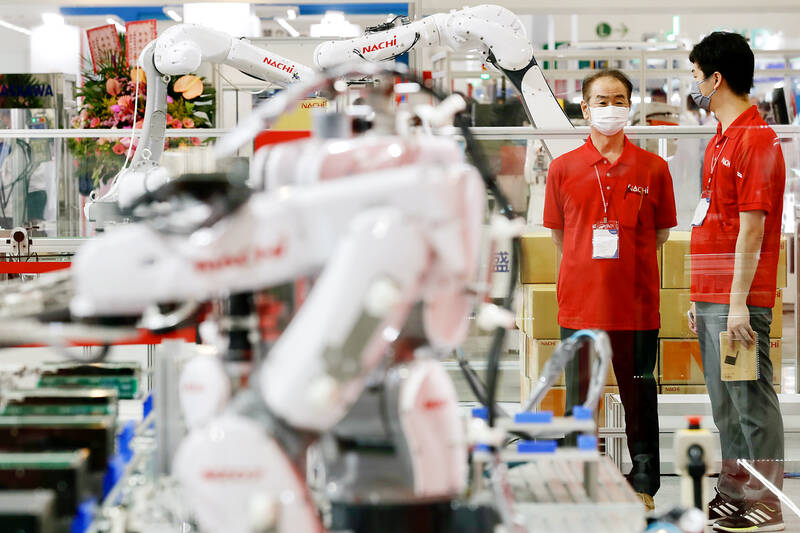Local business confidence last month weakened across all sectors, as high inflation at home and abroad slowed inventory digestion and consumer spending, the Taiwan Institute of Economic Research (TIER, 台灣經濟研究院) said yesterday.
The decline in sentiment was most evident among manufacturers, with the climate gauge shedding 1.09 points to 85.04, dropping for the ninth straight month to its lowest point since May 2020, the Taipei-based institute said, citing its monthly survey.
Consumer price hikes, monetary tightening and geopolitical tensions are taking a toll on global demand for tech and non-tech products, explaining why chemical product exports tumbled 10 percent last month, with 60 percent of local suppliers feeling the squeeze, TIER said.

Photo: Ritchie B. Tongo, EPA-EFE
Sentiment remained conservative, although demand for electronics used in vehicles and new smartphones held firm, the institute found.
As a result, only 12.1 percent of local manufacturers had a positive view about their business prospects for the coming six months, down from 15.2 percent a month earlier, it said.
The number of firms with negative outlooks rose 2.1 percentage points to 43 percent, TIER said, adding that conservative outlooks were common among manufacturers in the chemical, metal and machinery sectors.
Firms in the service sector reported a slowdown in business, with the confidence measure falling 2.03 points to 94.02, after a seasonal uptick linked to the summer vacation came to an end, it said.
Last month, most hotels and restaurants said that business was flat, while proprietary traders and securities firms took a hard hit from major TAIEX corrections, the institute said.
Looking forward, a recovery in domestic demand seems questionable, despite the reopening of Taiwan’s borders, it said.
As countries in Asia lift COVID-19 restrictions, Taiwanese are likely to prefer trips overseas, which could reduce domestic tourism spending, TIER said.
People could also become cautious about spending due to consumer price hikes and investment losses, it said.
Consequently, more than 80 percent of retailers are neutral about their business outlook for the coming six months, the institute said.
Restaurants are looking to benefit from year-end feasts and gatherings, as well as the arrival of foreign tourists, TIER said.
However, labor shortages would slow the pace of recovery, it added.
The business confidence measure for the construction industry dropped 2.55 points to 90.72, it said, adding that civil engineering firms are ramping up construction of public works projects before the end of the year, but property developers are slowing the pace, as sales rates have been disappointing amid economic uncertainty and construction costs remain high.
The construction sector expects business to be flat, based on government budgets and the economy changing gears, it said.

CHIP RACE: Three years of overbroad export controls drove foreign competitors to pursue their own AI chips, and ‘cost US taxpayers billions of dollars,’ Nvidia said China has figured out the US strategy for allowing it to buy Nvidia Corp’s H200s and is rejecting the artificial intelligence (AI) chip in favor of domestically developed semiconductors, White House AI adviser David Sacks said, citing news reports. US President Donald Trump on Monday said that he would allow shipments of Nvidia’s H200 chips to China, part of an administration effort backed by Sacks to challenge Chinese tech champions such as Huawei Technologies Co (華為) by bringing US competition to their home market. On Friday, Sacks signaled that he was uncertain about whether that approach would work. “They’re rejecting our chips,” Sacks

NATIONAL SECURITY: Intel’s testing of ACM tools despite US government control ‘highlights egregious gaps in US technology protection policies,’ a former official said Chipmaker Intel Corp has tested chipmaking tools this year from a toolmaker with deep roots in China and two overseas units that were targeted by US sanctions, according to two sources with direct knowledge of the matter. Intel, which fended off calls for its CEO’s resignation from US President Donald Trump in August over his alleged ties to China, got the tools from ACM Research Inc, a Fremont, California-based producer of chipmaking equipment. Two of ACM’s units, based in Shanghai and South Korea, were among a number of firms barred last year from receiving US technology over claims they have

BARRIERS: Gudeng’s chairman said it was unlikely that the US could replicate Taiwan’s science parks in Arizona, given its strict immigration policies and cultural differences Gudeng Precision Industrial Co (家登), which supplies wafer pods to the world’s major semiconductor firms, yesterday said it is in no rush to set up production in the US due to high costs. The company supplies its customers through a warehouse in Arizona jointly operated by TSS Holdings Ltd (德鑫控股), a joint holding of Gudeng and 17 Taiwanese firms in the semiconductor supply chain, including specialty plastic compounds producer Nytex Composites Co (耐特) and automated material handling system supplier Symtek Automation Asia Co (迅得). While the company has long been exploring the feasibility of setting up production in the US to address

OPTION: Uber said it could provide higher pay for batch trips, if incentives for batching is not removed entirely, as the latter would force it to pass on the costs to consumers Uber Technologies Inc yesterday warned that proposed restrictions on batching orders and minimum wages could prompt a NT$20 delivery fee increase in Taiwan, as lower efficiency would drive up costs. Uber CEO Dara Khosrowshahi made the remarks yesterday during his visit to Taiwan. He is on a multileg trip to the region, which includes stops in South Korea and Japan. His visit coincided the release last month of the Ministry of Labor’s draft bill on the delivery sector, which aims to safeguard delivery workers’ rights and improve their welfare. The ministry set the minimum pay for local food delivery drivers at